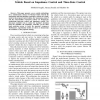Free Online Productivity Tools
i2Speak
i2Symbol
i2OCR
iTex2Img
iWeb2Print
iWeb2Shot
i2Type
iPdf2Split
iPdf2Merge
i2Bopomofo
i2Arabic
i2Style
i2Image
i2PDF
iLatex2Rtf
Sci2ools
ICRA
2009
IEEE
2009
IEEE
Design of man-machine cooperative nonholonomic two-wheeled vehicle based on impedance control and time-state control
This paper presents a new control methodology for a nonholonomic electric two-wheeled vehicle wherein the autonomous and man-machine cooperative controls are synthesized. In the proposed control scheme, the `autonomous control' and the `man-machine cooperative control' are designed by synthesizing time-state control and impedance control. The time-state controller tries to reduce the machine's deviation from the guideline, the impedance controller, on the other hand, generates power to assist the operator's maneuver. Furthermore, experimental results are shown to demonstrate the usefulness of the proposed strategy.
Autonomous Control | Electric Two-wheeled Vehicle | ICRA 2009 | Man-machine Cooperative Controls | Robotics |
| Added | 19 Feb 2011 |
| Updated | 19 Feb 2011 |
| Type | Journal |
| Year | 2009 |
| Where | ICRA |
| Authors | Shinkichi Inagaki, Tatsuya Suzuki, Takahiro Ito |
Comments (0)

